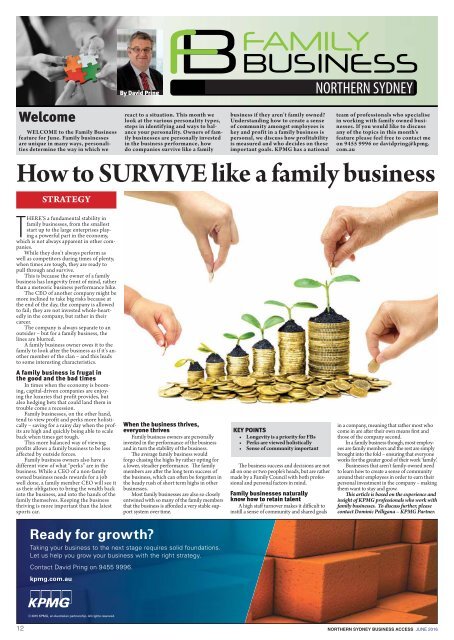CUSTODIAN
nvvj301K9RP
nvvj301K9RP
Create successful ePaper yourself
Turn your PDF publications into a flip-book with our unique Google optimized e-Paper software.
By David Pring<br />
BF<br />
FAMILY<br />
BUSINESS<br />
NORTHERN SYDNEY<br />
WESTERN SYDNEY<br />
Welcome<br />
WELCOME to the Family Business<br />
feature for June. Family businesses<br />
are unique in many ways, personalities<br />
determine the way in which we<br />
react to a situation. This month we<br />
look at the various personality types,<br />
steps in identifying and ways to balance<br />
your personality. Owners of family<br />
businesses are personally invested<br />
in the business performance, how<br />
do companies survive like a family<br />
business if they aren’t family owned?<br />
Understanding how to create a sense<br />
of community amongst employees is<br />
key and profit in a family business is<br />
personal, we discuss how profitability<br />
is measured and who decides on these<br />
important goals. KPMG has a national<br />
team of professionals who specialise<br />
in working with family owned businesses.<br />
If you would like to discuss<br />
any of the topics in this month’s<br />
feature please feel free to contact me<br />
on 9455 9996 or davidpring@kpmg.<br />
com.au<br />
How to SURVIVE like a family business<br />
STRATEGY<br />
THERE’S a fundamental stability in<br />
family businesses, from the smallest<br />
start up to the large enterprises playing<br />
a powerful part in the economy,<br />
which is not always apparent in other companies.<br />
While they don’t always perform as<br />
well as competitors during times of plenty,<br />
when times are tough, they are ready to<br />
pull through and survive.<br />
This is because the owner of a family<br />
business has longevity front of mind, rather<br />
than a meteoric business performance hike.<br />
The CEO of another company might be<br />
more inclined to take big risks because at<br />
the end of the day, the company is allowed<br />
to fail; they are not invested whole-heartedly<br />
in the company, but rather in their<br />
career.<br />
The company is always separate to an<br />
outsider – but for a family business, the<br />
lines are blurred.<br />
A family business owner owes it to the<br />
family to look after the business as if it’s another<br />
member of the clan – and this leads<br />
to some interesting characteristics.<br />
A family business is frugal in<br />
the good and the bad times<br />
In times when the economy is booming,<br />
capital-driven companies are enjoying<br />
the luxuries that profit provides, but<br />
also hedging bets that could land them in<br />
trouble come a recession.<br />
Family businesses, on the other hand,<br />
tend to view profit and perks more holistically<br />
– saving for a rainy day when the profits<br />
are high and quickly being able to scale<br />
back when times get tough.<br />
This more balanced way of viewing<br />
profits allows a family business to be less<br />
affected by outside forces.<br />
Family business owners also have a<br />
different view of what “perks” are in the<br />
business. While a CEO of a non-family<br />
owned business needs rewards for a job<br />
well done, a family member CEO will see it<br />
as their obligation to bring the wealth back<br />
into the business, and into the hands of the<br />
family themselves. Keeping the business<br />
thriving is more important than the latest<br />
sports car.<br />
When the business thrives,<br />
everyone thrives<br />
Family business owners are personally<br />
invested in the performance of the business<br />
and in turn the stability of the business.<br />
The average family business would<br />
forgo chasing the highs by rather opting for<br />
a lower, steadier performance. The family<br />
members are after the long term success of<br />
the business, which can often be forgotten in<br />
the heady rush of short term highs in other<br />
businesses.<br />
Most family businesses are also so closely<br />
entwined with so many of the family members<br />
that the business is afforded a very stable support<br />
system over time.<br />
KEY POINTS<br />
• Longevity is a priority for FBs<br />
• Perks are viewed holistically<br />
• Sense of community important<br />
The business success and decisions are not<br />
all on one or two people’s heads, but are rather<br />
made by a Family Council with both professional<br />
and personal factors in mind.<br />
Family businesses naturally<br />
know how to retain talent<br />
A high staff turnover makes it difficult to<br />
instill a sense of community and shared goals<br />
in a company, meaning that rather most who<br />
come in are after their own means first and<br />
those of the company second.<br />
In a family business though, most employees<br />
are family members and the rest are simply<br />
brought into the fold – ensuring that everyone<br />
works for the greater good of their work ‘family’.<br />
Businesses that aren’t family-owned need<br />
to learn how to create a sense of community<br />
around their employees in order to earn their<br />
personal investment in the company – making<br />
them want to stay and grow.<br />
This article is based on the experience and<br />
insight of KPMG professionals who work with<br />
family businesses. To discuss further, please<br />
contact Dominic Pelligana – KPMG Partner.<br />
Ready for growth?<br />
Taking your business to the next stage requires solid foundations.<br />
Let us help you grow your business with the right strategy.<br />
Contact David Pring on 9455 9996.<br />
kpmg.com.au<br />
© 2015 KPMG, an Australian partnership. All rights reserved.<br />
12 NORTHERN SYDNEY BUSINESS ACCESS JUNE 2016


